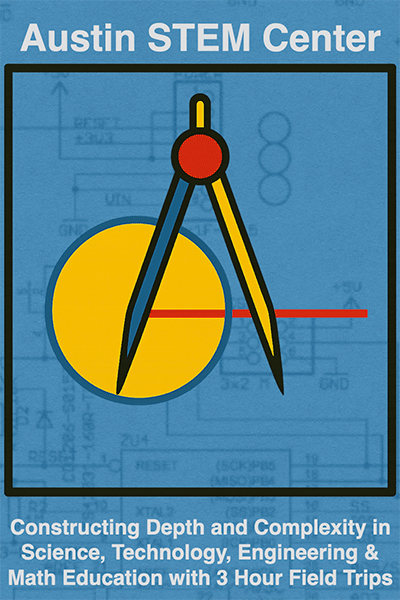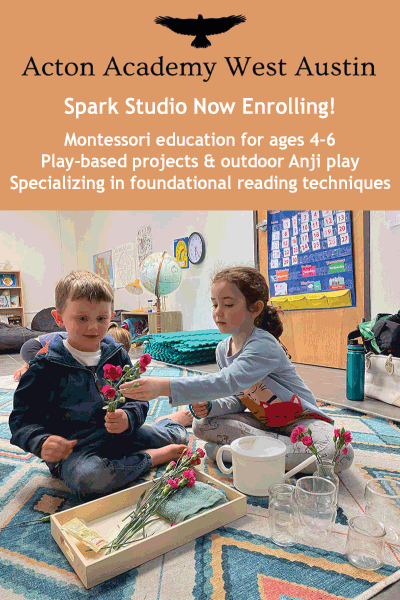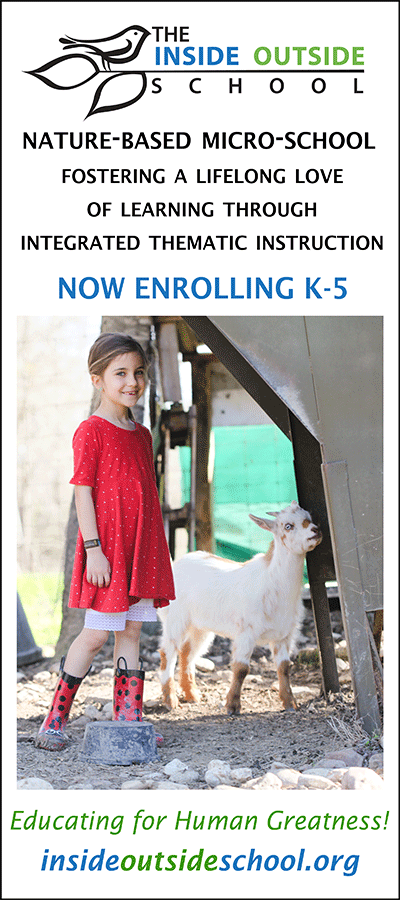Preparing for the SAT by means of alternative education
/Michael Strong is co-founder of the Khabele Strong Incubator, a new Austin school serving students of middle and high school age. He is also author of the book The Habit of Thought: From Socratic Seminars to Socratic Practice, a frequent speaker on TEDx stages, founder or co-founder of several successful schools, and an advocate for nurturing the entrepreneurial spirit as a force for social good. In this guest post, Michael addresses an issue I hear often in my consultation work with parents considering alt schooling for their kids: What about the SAT?
Many of those exploring alternative education models do so in part because they are repelled by the lockstep curriculum and testing regimen associated with traditional schooling. They are committed to a “follow the child” philosophy, according to which educators support student interests rather than test prep.
While I am committed to personalized education that nurtures a child’s interests, I am not hostile to the SAT. In fact, I find that, under some circumstances, an alternative education can result in superior SAT scores.
This perspective is based on my own experience. I was raised on a farm with a 1.5-hour bus ride each direction. Our small black-and-white television received two channels occasionally; my siblings and I had to be pretty desperate to try to watch TV. Within this context, I became a reader—a voracious reader. In sixth grade, a friend and I recorded the books we were reading. I was already reading a 200-page book every night.
At the same time, he and I would play chess on the long bus rides to and from school. Because the chess pieces would often fall off the board as we went over bumps, we became good at remembering where they were on the board from memory. Eventually we quit using the board entirely and played chess games with each other in our heads as we endured the long rides to and from school.
My real learning took place during reading and chess. I also did well on “memorize-and-forget” tests at school, doing almost no homework. I was admitted to Harvard without ever studying for the SAT (really without knowing what the SAT was). My parents, good working-class people, had no idea that Harvard was hard to get into; all they knew was that I was going to college back East somewhere.
Thus my own experience was dramatically different from that associated with children of angst-ridden “helicopter parents” today. All I did to get into Harvard was have fun reading and playing chess. What’s the big deal?
As an educator, I’ve focused on creating schools at which kids mostly have fun. But because of my natural intellectual bent, the form in which the “fun” tends to manifest itself is largely intellectual: we read and discuss intellectually serious articles, we play around with mathematical and scientific ideas, etc. And it is all a natural, spontaneous process based on engaging students’ authentic interests.
Not all students will necessarily obtain high SAT scores. But high-level academic performance does not require tedious studying. If one can create an environment in which students have fun engaging in intellectual activity, then high-level performance on the SAT is often a natural, spontaneous outcome.
There are a couple of reasons why the SAT is associated with stressful studying rather than spontaneous joy:
- Conventional schooling provides little intellectual development. The majority of class time is devoted either to classroom management or to “memorize-and-forget” activities. If we were able to monitor blood flow to the prefrontal cortex of most students during most school days, we would find little activity going on there. Most students most of the time are bored, flirting, joking, or goofing off in school. Insofar as much school activity is nonlearning, of course students are stressed out by a measure of cognitive functioning—their brains have been turned off for years, and now we ask them to turn it back on?
- Some parents place their own anxieties related to social status onto their children. In some cases they force children into competitive college admissions when such a direction is entirely inappropriate for that particular child. The result is anxiety and resentment toward the competitive process itself.
Young people are sponges who absorb their environment. If they are placed in an environment in which others are trying to avoid learning as much as possible, most will also work to avoid learning. If they are placed in an environment in which the play is primarily physical, or social, then most will become excellent at physical or social forms of play. If they are placed in an environment in which the play is primarily intellectual, then most will become excellent at intellectual forms of play.
It is a bizarre artifact of coercive schooling that intellectual activity is the one domain in which people are least likely to understand the playfulness of it. For many people, the term “intellectual” has heavy, unpleasant connotations. Just as alternative educators would rejoice in supporting their theatrically gifted students to star on Broadway, or their musically gifted students to win on American Idol, we should rejoice in supporting those with intellectual appetites in achieving in the manner that gives them the most joy.
For me, play and excellence are intimately related no matter what a child’s gifts. When I work with young people who are brilliant theatrically or musically, I want to help them develop their gifts in a playful, yet serious, manner. When I work with young people who thrive on social engagement, I love showing them ways in which the world richly rewards their gifts when properly directed (such as sales), and encourage them to interweave play and the development of extraordinary skill.
My mission as an educator is to identify the genius within every child, and then coach him or her to a joyful expression of that genius. From such a perspective, taking the SAT for some is really no different from an audition for others—simply a natural part of their particular journey. Sometimes “follow the child” implies creating an intellectually rich, yet playful, environment that happens to lead to great SAT scores. Sometimes it means creating a dramatically rich, yet playful, environment that happens to lead to an extraordinary range of acting skills.
Someday all students will attend “school” where most of the time they are engaged in joyful, yet serious and demanding, activities. And we’ll all wonder about that peculiar institution of the twentieth century that resulted in teen rebellion and the mass drugging of an entire generation of young people.
Michael Strong













